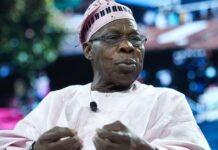Activist lawyer Deji Adeyanju has emphatically stated that only the residents of the Federal Capital Territory (FCT) can determine their senator in the 2027 elections, not Minister Nyesom Wike. Adeyanju’s comments come in the wake of a public dispute between Wike and the current FCT senator, Ireti Kingibe.

Kingibe recently criticized Wike for focusing on infrastructural projects that, according to her, have minimal impact on FCT residents. She accused the minister of neglecting the essential needs of the FCT populace. In response, Wike warned Kingibe that she would not be re-elected to the Senate in 2027.
Adeyanju took to social media platform X to voice his disapproval of Wike’s assertion. He highlighted that the political dynamics in FCT differ significantly from those in Rivers State, where Wike served as governor. Adeyanju pointed out that electoral outcomes in Rivers State have often been marred by violence and manipulation, implying that such tactics would not be acceptable in the FCT.
“Only the people of FCT can decide who becomes Senator in 2027, not Wike. The arrogance of power is what will make Wike think he can decide for the people,” Adeyanju posted. “FCT is not Rivers, where people write results and shoot guns. Even incumbent presidents get defeated in the FCT.”
Adeyanju’s remarks underscore the importance of democratic processes and the power of the electorate in determining their representatives. He criticized what he perceived as Wike’s overconfidence and warned against underestimating the electorate’s independence.
“I know these folks have 100% control of INEC and other rigging mechanisms, but the arrogance is truly uncalled for,” Adeyanju continued. “Nigerian politicians are like power-drunk Nigerian celebrities and pastors who can boast openly about getting the police to lock you up, and they will eventually do it.”
This confrontation between Wike and Kingibe has brought attention to the broader issue of political influence and power dynamics within Nigeria’s capital. Adeyanju’s comments resonate with many who advocate for a fair and transparent electoral process, free from external interference and intimidation.
Wike’s tenure as Minister of the FCT has been marked by significant infrastructure projects, which he argues are beneficial for the development of the territory. However, critics like Kingibe and Adeyanju argue that these projects do not address the immediate and pressing needs of the residents.
As the 2027 elections approach, this debate highlights the critical role of the electorate in holding their representatives accountable and ensuring that their voices are heard in the political process. The controversy also serves as a reminder of the need for politicians to respect the democratic process and the will of the people they serve.
Adeyanju’s comments serve as a powerful reminder of the principles of democracy and the importance of allowing the electorate to make their own choices, free from undue influence and coercion. As the political landscape in the FCT continues to evolve, the voices of its residents will undoubtedly play a pivotal role in shaping its future.




